News
On November 24, 2021, with the joint efforts of the organizer, China Oceanic Development Foundation (the Foundation), co-organizer Fujian Institute of Oceanography, lecturers, Chinese and foreign students, and other relevant parties, the two-week workshop on Marine Spatial Planning and Blue Economy Development for Maritime Silk Road Countries (hereinafter referred to as the Workshop) was successfully completed. On the afternoon of the 24th, the closing ceremony of the Workshop was held in Xiamen. Pan Xinchun, Vice Chairman and Secretary-General of the Foundation, Lin Huaiyuan, Party member and Chief Engineer of Xiamen Ocean Development Bureau, and Lian Zhangfei, Director of Fujian Institute of Oceanography and other leaders attended the closing ceremony and delivered speech online or on-site. Chen Xu, Deputy Director of International Exchange and Training Center, Fujian Institute of Oceanography, presided over the closing ceremony. Luo Meixue, researcher of Fujian Institute of Oceanography, and Dr. Angel Herrera Ulloa, Director of Bioscience Department, National University of Costa Rica, respectively delivered the graduation speech on behalf of the Chinese and foreign participants.
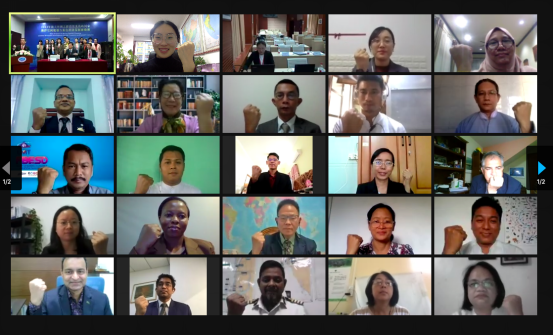
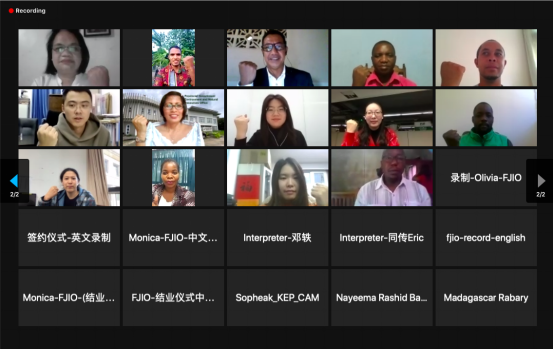 Online group photo of some participants of the Workshop
Online group photo of some participants of the Workshop
In his speech, Pan Xinchun expressed his heartfelt thanks to the Fujian Institute of Oceanography for its great attention, extraordinary arrangement, rigorous organization, and thoughtful service to the Workshop and fully appreciated its rigorous working attitude, efficient working style, and good service enthusiasm. He showed sincere gratitude to all the lecturers for their diligent preparation of lectures, elaborate teaching of the Chinese experience, and patience in answering questions and solving problems. He also extended warm congratulations to the Chinese and foreign participants on the knowledge they have acquired in marine management and spatial planning, the experience they have gained in China's marine economic development, and the new friendships they have gained.
Pan Xinchun said that as one of the advocates, organizers, servers, lecturers, and learners of the Workshop, he felt quite a lot. First, the organizer has attached great importance to the Workshop. China Oceanic Development Foundation has listed the Workshop as a key work in 2021, prepared special funds for the Workshop, including the expenses for foreign students to attend the Workshop and field trip in China, and sent leaders to attend the opening ceremony and closing ceremony and give lectures in person. Second, the organizer has made extraordinary arrangements. After the Fujian Institute of Oceanography received the task, Director Lian Zhangfei took it seriously, convened a special study, and set up a special preparatory team. A lot of careful work was done in contacting Chinese and foreign participants, curriculum design, lectures hiring, offline venue arrangement, online and offline connection, etc. to ensure the smooth opening and successful completion of the Workshop. Third, the participants are interested in the Chinese experience. During the learning process, the foreign participants were most interested in the development experience of China. For Chinese experience, equal emphasis is made on conservation and development, with resolute protection for the oceans that need to be protected and active utilization for the oceans that are utilizable. The marine function zoning in China has been reasonably delimited for conservation area and utilization area according to the natural property of the ocean and the social development needs. For example, according to the 2010-2020 edition of China's national marine function zoning and the marine function zoning of 11 coastal provinces and cities, the sea areas under China's jurisdiction are divided into 1,931 first-class functional zones and over 40,000 second-class functional zones. In view of the above, marine conservation areas, marine parks, and marine pasture demonstration areas have been established, and marine ecological red line zones, three marine fishery sites (spawning ground, feeding ground, and wintering ground) and one channel (migration channel) have been delimited to stretch the marine conservation areas close to 10 percent of the sea area under jurisdiction. Meanwhile, 12 marine industries have been established by actively developing and utilizing marine resources. In 2019, the total marine economy reached RMB 8941.5 billion, accounting for 9% of GDP. The new round of China's maritime spatial planning is being formulated by the people-centered concept of giving priority to ecology, conservation, green utilization, and sustainable development. Fourth, the lecturers are serious and responsible. All lecturers have a rich theoretical foundation and practical experience. When preparing lessons, they linked theory with practice and combined policy with cases to illustrate both in pictures and texts. The lecturers explained the profound in simple terms, vividly and easily understood. They were patient, dedicated to details, and lively when interacting with the participants. Fifth, the participants are full of expectations in attending lectures. The participants came to study with mission and expectation. In class, the participants were all absorbed and wrote down key points and questions for after-class communication and consultation. When asking questions, the participants went straight to the point, strove to be the first, and did not give up until the questions were fully understood. In thinking, they reflected on the content of lectures, thinking about the Chinese experience and how to use it for reference. The participants said that they felt deeply about gains after the half-month of learning and two weeks of deliberation.
Pan Xinchun expressed his hope that the participants could turn the two hopes and ten requirements he put forward at the opening ceremony of the Workshop into the methods, capabilities, and actions of the maritime silk road project of "Promoting Marine Spatial Planning and Contributing to Blue Economy Development" to continuously acquire new achievements of the maritime silk road project. He stressed that the Workshop is just the beginning, and in the future, the various training courses themed over "Accelerating the maritime silk road project" and "Rapid development of marine economy in maritime silk road countries" will be held, and friends from home and abroad are welcome to actively participate in.
Lin Huaiyuan said in his speech that as a member of developing countries, the Chinese government has been committed to consolidating and developing solidarity and cooperation with the majority of developing countries, discussing the road of maritime cooperation, and sharing the experience of maritime economic development. This workshop is another useful attempt for China and other developing countries to learn from each other, achieve common development, and go forward hand in hand. He hoped that more friends from countries along the Belt and Road could establish contacts with Chinese marine-related research institutes and enterprises to jointly promote the development of the global blue economy and build a maritime community with a shared future.
In his speech, on behalf of the organizer -- Fujian Institute of Oceanography, Lian Zhangfei extended warm congratulations to the participants who have completed the Workshop and appreciated the China Oceanic Development Foundation, relevant departments of Xiamen Municipal Government, and experts and scholars that have provided guidance and support for the successful hosting of the Workshop. He said that during the Workshop, the Chinese and foreign participating officials listened to a series of special lectures on marine spatial planning and blue economy development brought by government officials and experts with theoretical knowledge and practical experience, including the introduction of maritime silk road project, Chinese marine governance practices and achievements, ecosystem-based coastal zone spatial governance, marine function zoning system and blue economy development, and promoting blue economy development amidst scientific and technological innovation, etc. by China Oceanic Development Foundation. These special lectures demonstrated the Chinese concept of ocean governance in an all-round, multi-dimensional, and in-depth way and provided foreign participants with the Chinese plan of ocean spatial planning. He stressed that the Fujian Institute of Oceanography will make good use of the public service platform of the Workshop organized by the China Oceanic Development Foundation, pool experts and scholars in the field of marine spatial planning at home and abroad, and prompt the maritime economic development of the maritime silk road countries by sharing Chinese experience and practices.
Luo Meixue, representative of Chinese participants showed gratitude in a speech to the maritime silk road cooperation platform of “Promoting Marine Spatial Planning and Contributing to Blue Economy Development” built by the China Oceanic Development Foundation, which provides opportunities for Chinese and foreign participants to carry out in-depth communication and discussion with domestic scientific research institutes, colleges and universities engaged in research on marine spatial planning in theory, methods and techniques of marine spatial planning, and conduct a series of brainstorming sessions on marine spatial planning and blue economy development with marine practitioners from Asia, Africa, Latin America, and South Pacific island countries. She said the Workshop points out the direction for the participants in marine spatial planning, marine ecological environment protection, and international scientific and technological exchanges and cooperation, and strengthened their lifelong determination to work for the marine career. She hoped that the Chinese and foreign participants could continue to maintain contacts and exchanges, carry out practical cooperation, and make efforts to strengthen the development of the global blue economy and improve the well-being of people around the world.
Angel•Herrera•Ulloa from Costa Rica spoke on behalf of the foreign participants. He said that the Workshop once again made him feel the kindness and friendship of the Chinese people as well as the extensive and profound Chinese culture. He quoted eight Chinese proverbs to express what he learned from attending the Workshop. First, "Open different locks with different keys, and make a case-by-case analysis".Costa Rica, he said, has accumulated more than 20 years of experience in marine spatial planning, but in the past two weeks, he learned from what China, the Philippines, East Timor, Burma, Mozambique, Bangladesh and other countries have done that the implementation of marine spatial planning in various countries must do as the Romans do and act according to circumstances. Second, "If you know your enemies and know yourself, you will not be imperiled in every battle". He cited Costa Rica as an example of a country that has a planning vision but lcannot execute. We should master the method of combining planning and vision with execution by learning the experience of other countries. Third, "Nothing ventured, nothing gained". We are aware that there are many difficulties in the implementation of the plan. The process is by no means smooth, but it is worth our efforts to overcome. Fourth, "It is not advisable to dig a well till you are thirsty". He said countries with less experience should learn from experienced countries like China to avoid detours and take precautions. Fifth, "Adopt a long-term plan to secure something big". Marine spatial planning requires patience and perseverance. Sixth, "Women hold up half the sky". Both the Sustainable Development Goals (SDGS) of the United Nations and the marine spatial planning aim to build a comprehensive and inclusive world and promote gender equality. Seventh, "Time is running out, act now". The world is a community with a shared destiny. We must hold accountable for the problems faced rather than shuffle our responsibilities. In particular, we need to learn from Chinese experience and work together to build our beautiful home. Eighth, "Better than a thousand days of diligent study is one day with a great teacher". He thanked the China Oceanic Development Foundation for providing such a good learning program, allowing participants to learn from experienced teachers and exchange views with each other, to better serve their own countries and regions.
In the end, the course-completion certificates were granted to all participants in the ceremony via video. Accompanied by background music, all participants were excited and reluctant to part. The 14-day training ended in a blink of an eye. The participants made friends, learned from each other, opened their mind, and expanded cooperation. Although this Workshop is over, the next one will bring us together again soon to discuss our experience and imagine the future together.
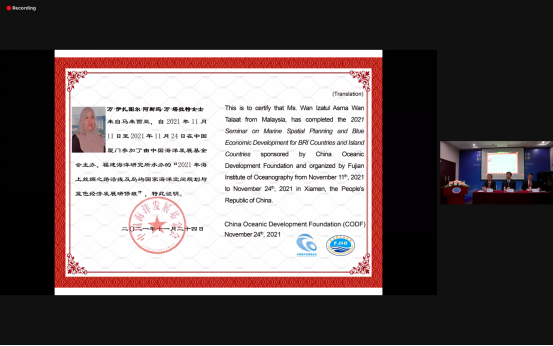
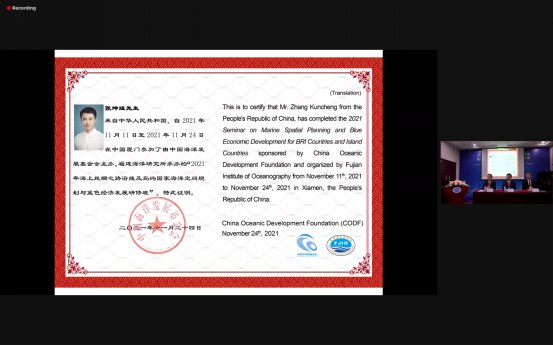 The participants being granted the course-completion certificates.
The participants being granted the course-completion certificates.
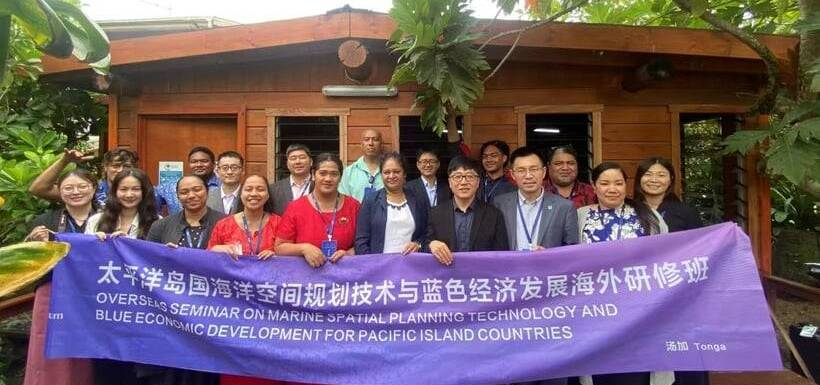
- Marine Spatial Planning Study Tour 2023 Officially Launched
- President Lv Bin Met with Her Royal Highness of Tonga Pilolevu Tuita in Beijing and Signed a Memorandum of Understanding on Cooperation
- Dialogue eyes key role of youth in RCEP region's growth
- Pan Xinchun Attends the 2022 China Ocean Action Roundtable and Introduces Ten Major Actions



 Home
Home  About Us
About Us  Our Programs
Our Programs  Cooperative Partner
Cooperative Partner